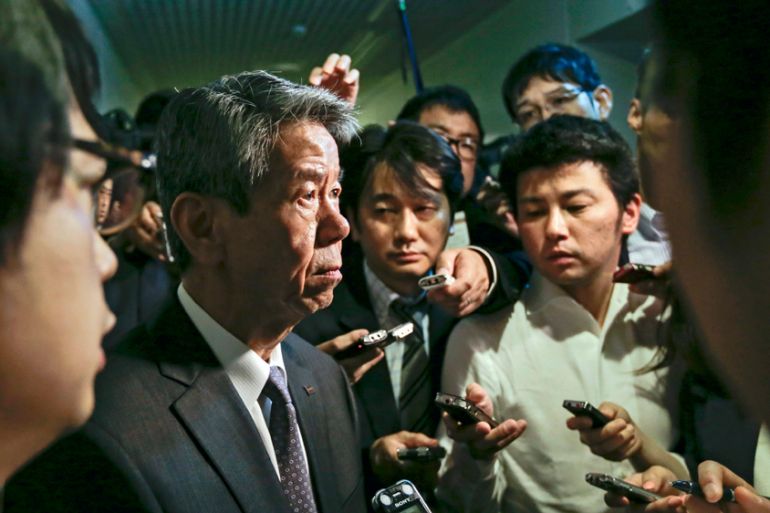Key questions in Toshiba scandal still unanswered
Mystery surrounds responsibility for ‘inappropriate accounting’ after months of investigation into $1.9bn loss cover-up.

Tokyo, Japan – Despite three investigations into manufacturing giant Toshiba Corporation’s illicit accounting practises, the revelation of almost $1.9bn in concealed losses over six years, and the resignation of half of the company’s board of directors, independent financial experts closely following the case say they still do not know why it happened or who is ultimately responsible.
The Toshiba accounting scandal “is one of the most serious wrongdoings in Japanese corporate history”, Nobuo Gohara, a lawyer and visiting professor at Kansai University, told the foreign press in Tokyo recently.
Keep reading
list of 4 itemsBiden labels Japan and India ‘xenophobic’ along with China and Russia
KFC Malaysia temporarily closes outlets amid Gaza boycott
Turkey says it halts trade with Israel over Gaza aid access
“Yet, at the same time … why these things happened and what was the background to all this – almost nothing has been made clear,” Gohara said.

Speaking at the same press conference, Yuji Hosono, a certified public accountant experienced in corporate auditing, stated: “In Japan, the Toshiba case is called ‘inappropriate accounting’, not fraudulent accounting. I do not understand why.”
The first inkling that something was wrong came in February when news broke that the Securities and Exchange Surveillance Commission (SESC), Japan’s market watchdog, was investigating certain Toshiba accounting methods.
Toshiba conducted its own internal investigation and found irregular accounting practises had taken place throughout Toshiba Group companies, so the company had no choice but to establish an independent investigation committee.
Shocking revelation
This team of outside lawyers and accountants delivered its damning report on July 20: Toshiba had covered up losses of about $1.2bn by inflating its annual profits since 2009.
Mass resignations of executives immediately followed, including those of the past three presidents. Since then Toshiba has amended and restated those losses at $1.9bn.
The news stunned Japan’s business world and citizens alike.
Toshiba employs 200,000 people worldwide and manufactures a variety of goods, ranging from electronic components to outfitting nuclear power stations.
That such a respected blue-chip company with a 140-year history could stoop to such accounting tricks as overstating sales and profits, understating losses, and delaying the recording of operating expenses, came as a shocking revelation.
Yet from the beginning, the independent investigative committee was limited in what it could look at.
Gohara noted while the committee’s report strongly criticises successive Toshiba leaders, “when it comes to the relationship between the company and the outside auditor, there is almost no mention of it”.
“In other words, I can say the independent committee’s report does not get to the heart of the problem at all,” he said.
RELATED: Japan: Politics, power and the press
The auditing company in question is Ernst & Young ShinNihon. It also happens to be the auditor for several other companies involved in past high-profile accounting scandals, most notably the Olympus scandal in 2011, where losses of $1.5bn were concealed from shareholders.
Gohara had worked with ShinNihon on an earlier case and was then appointed to chair an auditing inspection committee to look into the problems underlying the Olympus scandal. His committee found no wrongdoing by ShinNihon, but he did make a number of recommendations for the auditors to follow should similar scandals occur in the future.
Given this close working relationship, Gohara said he could only be critical of the part ShinNihon played in the Toshiba affair.
![Nobuo Gohara, left, and Yuji Hosono at a press conference in Tokyo in September [John Boyd/Al Jazeera]](/wp-content/uploads/2015/10/53c5f4f569ab447f87f1c439f92c04f8_18.jpeg)
“If ShinNihon had really learned from the bitter experiences of the Olympus scandal, then they would have launched a special investigation committee that would have regarded with suspicion the management of Toshiba,” said Gohara.
When asked about criticism of its role in the scandal, ShinNihon official Hiroyuki Sato said the company was unable to comment because of a confidentiality clause in the client’s contract.
Hosono pointed out that ShinNihon was the auditor that signed off on the original fraudulent Toshiba accounts, yet the same company was asked to give its stamp of approval for the newly revised accounts Toshiba produced in September.
“What is this? This is really not something that can be taken seriously,” said Hosono.
‘Large black cloud’
SESC is now studying the revised accounts, but Hosono said he doesn’t expect that Toshiba will receive anything more than a fine when the case is settled.
As a consequence of the scandal, Tokyo Stock Exchange has already designated Toshiba’s shares as “securities on alert” and fined the company $760,000 for “undermining the confidence of shareholders and investors”.
|
|
| Off the Rails: A Journey Through Japan |
Meanwhile, the Japanese media is reporting SESC is preparing to fine the company. As a contingency, Toshiba has set aside $70m as a “reserve for administrative monetary penalty”.
That would be an unprecedented amount and many times higher than the previously high $13.3m paid by IHI Corporation in 2007 for concealing losses.
In addition, Toshiba also faces the possibility of lawsuits from angry shareholders in Japan who have seen the company’s share price tumble.
Such action is already being taken in the US, where a disgruntled investor filed a class-action lawsuit against Toshiba in June. The Rosen Law Firm representing the plaintiff has called for other Toshiba shareholders to join the suit.
Yet such an outcome leaves unanswered how all this came about, why the fraud could be maintained for so long, and who should take direct responsibility.
Gohara said this is a missed opportunity for Japanese authorities to learn from mistakes and ensure they won’t be repeated.
As it stands now, he said, “a large black cloud is hanging over all of Japanese society”.